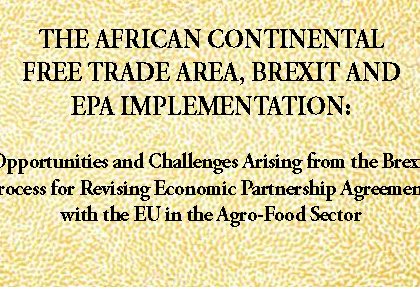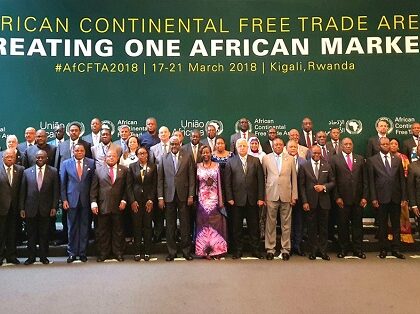AFRICA LOSES NOTHING IF IT DOES NOT SIGN THE EPAs; IT RATHER SAVES ITS FUTURE DEVELOPMENT!
We, African civil society organisations campaigning on the Economic Partnership Agreements (EPAs), meeting in Accra, Ghana, from 3-5 September 2007, under the umbrella of the Africa Trade Network to review the EPA negotiations, re-affirm our opposition to these self-serving Free Trade Agreements that the European Union (EU) seeks to impose on African, Caribbean and Pacific (ACP) countries, and which will destroy the economies of these countries.
We condemn the growing abuse by the European Commission (EC) of the December deadline for the conclusion of the negotiations and for the expiry of the Cotonou waiver to put unjustified pressure on our governments to concede to the EU’s proposals on the EPAs.
We are dismayed that, in spite their own explicitly stated lack of preparedness to conclude the negotiations by December, our governments are allowing themselves to be dragged along the EU agenda. And we call on the governments to demand their right under the Cotonou agreement for the EU to maintain their market access in the absence of an EPA agreement.
When the EPA negotiations were launched, civil society organisations from all over Africa, the Caribbean, the Pacific and Europe warned that the EPAs were anti-developmental. We pointed out that the EPAs posed a threat not only specifically to government revenue, local producers and industries, food sovereignty, essential public services, and the regional integration of African countries; but also to the right and capacity in general of African countries to develop their economies according to the needs of their people and their own national, regional and continental priorities.
Five years after the start of the negotiations, the worst fears of civil society are about to be confirmed. The European Union continues aggressively to pursue its agenda for the opening up of ACP economies, across the board, for the free entry of European goods and free operation of European investors. The EU is demanding that these countries must eliminate all duties on up to 80% of agricultural and industrial products imported from Europe; that governments in the ACP should allow European investors free access to any sectors of their economies; and that these governments should not give preferences to domestic investors over European investors.
Moreover, the EU’s promises to address the so-called “supply side constraints” and provide funds to meet the “adjustments costs” of EPAs have turned out simply to be so many empty promises through which the EU has contrived to lure our countries into the one-sided negotiations. Instead of specific pro-development policy measures, based on the actual imperatives of our economies, the EU insists that the free trade agenda that it is proposing is enough to bring development. The 2 billion euros that the EU has touted with fanfare as support for EPA countries has essentially turned to be an accounting gimmick, with little more that 700 million euros actually available to be shared among the 78 ACP countries. In any case, it is now widely accepted that EU money, however generous, can never put right the fundamental wrongs of the EPAs.
In addition to these thread-bare promises, the EC has resorted to blackmail and dis-information. It has threatened countries which are not willing to play along its agenda with cuts in aid, while promising ‘incentive tranches” to those who are willing to ignore their own concerns and “meet” the negotiating deadline. EC officials are touring different countries, “threatening” exporters with loss of export markets in the EU if the EPAs are not signed in December, ignoring the EU’s treaty obligations to maintain current levels of market access for ACP exporters in the absence of EPAs.
On their part, African governments still seem unable and/or unwilling to give expression to the fundamental logic of their stated developmental concerns in the overall architecture of the EPA and its different themes. Rather, they continue to haggle with the EU over such narrow even if legitimate issues as “supply-side constraints” and “adjustment costs”, even as these are being made hollow by the EU’s practice.
We re-assert the widely-acknowledged principle that Africa’s development can only be achieved on the basis of a strategy driven by the needs and priorities of our people. This principle must be the basis for any relationship with the EU. It should and cannot be bargained away, as is being done in the EPAs, for continued access to the EU market, especially when there are credible alternatives to ensure that market access.
In this regard, we re-affirm the positions of the StopEPA Campaign that EU-ACP trade cooperation should protect ACP producers, as well as domestic and regional markets; respect the principles of non-reciprocity and special and differential rights; exclude the pressure for trade and investment liberalisation; and support the space of ACP countries to formulate and pursue their own development strategies.
We therefore call upon our governments to:
(a) reject the EU pressure to conclude the EPA negotiations by the end of December 2007; and also reject the false claims by the EU that only the EPAs can protect access of African (and other Caribbean and Pacific) exporters to the European market;
(b) reject the EU agenda for the EPA—in particular
-the reciprocal elimination of tariff on goods;
-the liberalisation of services;
-rules on investment, competition and government procurement, and
-strengthened obligations in intellectual property rights;
(c) create space for exploration with their citizens and other stake-holders of existing and viable options on the basis of which to establish a relationship which is consistent with the developmental imperatives of Africa’s economies and with Africa’s own integration agenda.
To this end, furthermore, we demand that our governments assert their right, and that the EU should live up to its obligation, under the Cotonou Agreement to maintain access to the EU market in the absence of EPAs. Thus, we call on both parties to adopt:
(a) the “Everything But Arms” arrangement for Least Developed Country members in the ACP; and
(b) the GSP+ (that is, the ‘Special Incentive Arrangement For Sustainable Development And Good Governance’), which can and must be improved even further, for the developing country members.
We call on Africa’s people to join the movement of citizen’s groups against Europe’s self-serving EPA agenda, and to strengthen the demand on our governments to stand firmly together in the interests of our peoples and our countries, regions and the whole continent
We call further for the continued solidarity of citizens in Europe, and all over the world, in the face of increasingly aggressive “Global Europe” agenda from Brussels, to act with us to safeguard and promote the right of the people of Africa to develop in response to their own needs and imperatives.
We pledge to work together with allies in the coming critical months, around such moments as the 27 September Global Day of Action against EPAs, and the negotiating processes in all the regions to intensify our campaigns in Africa, Caribbean, the Pacific, Europe and globally to ensure that the EPAs do not come into being.
African countries have nothing to lose in not signing the EPAs; on the contrary, by not signing the EPAs they will be saving their future development!


